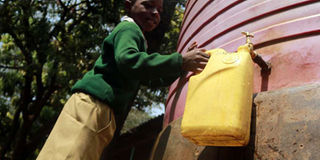Let’s ensure sustainable water supply

A pupil of Pandpieri Primary School in Kisumu fetches drinking water on January 2, 2018. Human health, food security and energy all depend on water. PHOTO | TONNY OMONDI | NATION MEDIA GROUP
What you need to know:
- Agriculture requires large quantities of water for irrigation and various production processes.
- Japan and Kenya are also working together to ensure sustainable energy systems to capture the energy in moving water.
"Water is life" is a common saying in every community.
This is a recognition of the fact that water is central to sustainable development.
Human health, food security and energy all depend on water, and without water we could not hope to sustain our livelihoods.
But with the rising global population, urbanisation, change in consumption and economic growth, our demand for water is ever increasing.
According to the United Nations, agriculture accounts for 70 per cent of global water withdrawal, 90 per cent of global power generation is water-intensive, and roughly 75 per cent of all industrial water withdrawals are used for energy production.
Furthermore, 42 per cent of Kenyans do not have access to potable water, while 70 per cent still rely on unhygienic sanitation solutions.
PUBLIC HEALTH
As President Uhuru Kenyatta’s ‘Big Four’ agenda pushes for health, food security, affordable housing and manufacturing, Japan’s partnership with Kenya on water consists of a wide array of projects in support of socio-economic development in these critical domains.
There is an inseparable linkage between water and the ‘Big Four’.
Safe water supplies, hygienic sanitation and good water management are fundamental to public health.
Through the development of the National Water Master Plan, Japan has been working with Kenya in assessing and evaluating the availability, reliability and quality of this country’s water resources, taking into consideration the effect of climate change and rapid urbanisation.
BOREHOLES
Through the Urban Water Supply project, water systems were rehabilitated and upgraded to provide improved safe water access to communities in Meru, Embu, Kapsabet and Narok towns.
More than 180,000 residents also benefited from some 18,900 cubic metres of water produced with Japan’s assistance.
Under the Rural Water Supply project, Japan installed about 60 boreholes in Kitui, Machakos and Makueni counties and the 70 boreholes that serve 100,000 residents of Baringo.
Our current work focuses on the reduction of non-revenue water (NRW) across the country by building the capacities of service providers.
Non-revenue water is water that is produced but does not earn revenue since it is lost in the system as physical or commercial losses, which affects the sustainability and economic viability of water utilities.
Kenya loses about 430,000m³, equivalent to Sh12.2 billion, per year.
REVENUE LOSSES
Clean and accessible water is essential. Japan has achieved universal access to water supply and sanitation and has one of the lowest NRW losses, where quality of drinking water and waste water treatment is strictly adhered to.
Water is also a key contributor to food security. Agriculture requires large quantities of water for irrigation and various production processes.
The projects on Mwea Irrigation Development and Rice-based and Market-oriented agriculture promotion boost agricultural efficiency by helping to save water while increasing the production of rice and income.
FOOD
Japan and Kenya are also jointly developing climate- and disease-resistant rice varieties, compatible with low soil fertility and resilient to climate change.
This is being achieved through the Rice Research for Tailor-made Breeding and Cultivation Technology Development Project.
Rice is the 'ugali' of Japan and has been cultivated for more than 3,000 years as the staple food.
So, the Japanese are very good at growing it and are keen to share this knowledge with various Kenyan institutions in working with the residents.
Japan and Kenya are also working together to ensure sustainable energy systems to capture the energy in moving water.
In 2007, Japan supported the Sondu Miriu Hydropower Project and construction of Sang’oro Hydropower Power Plant.
ELECTRICITY
More recently, Japan supported the implementation of the Ultra Low-Head Micro Hydro-Power project.
This is an effective energy source using Japanese technology to generate electricity at only two-metre-high drops in the Mwea irrigation canal while considering local topography.
This is an independent mini grid operated and owned by the community.
And in collaboration with the county government, multiple workshops and trainings have been conducted in building the local capacity.
In a world where demand for quality water is ever growing, we urgently need to manage water more sustainably and change the way we assess, manage and use this limited resource.
Mr Uesawa is Japan’s Ambassador to Kenya. [email protected]




